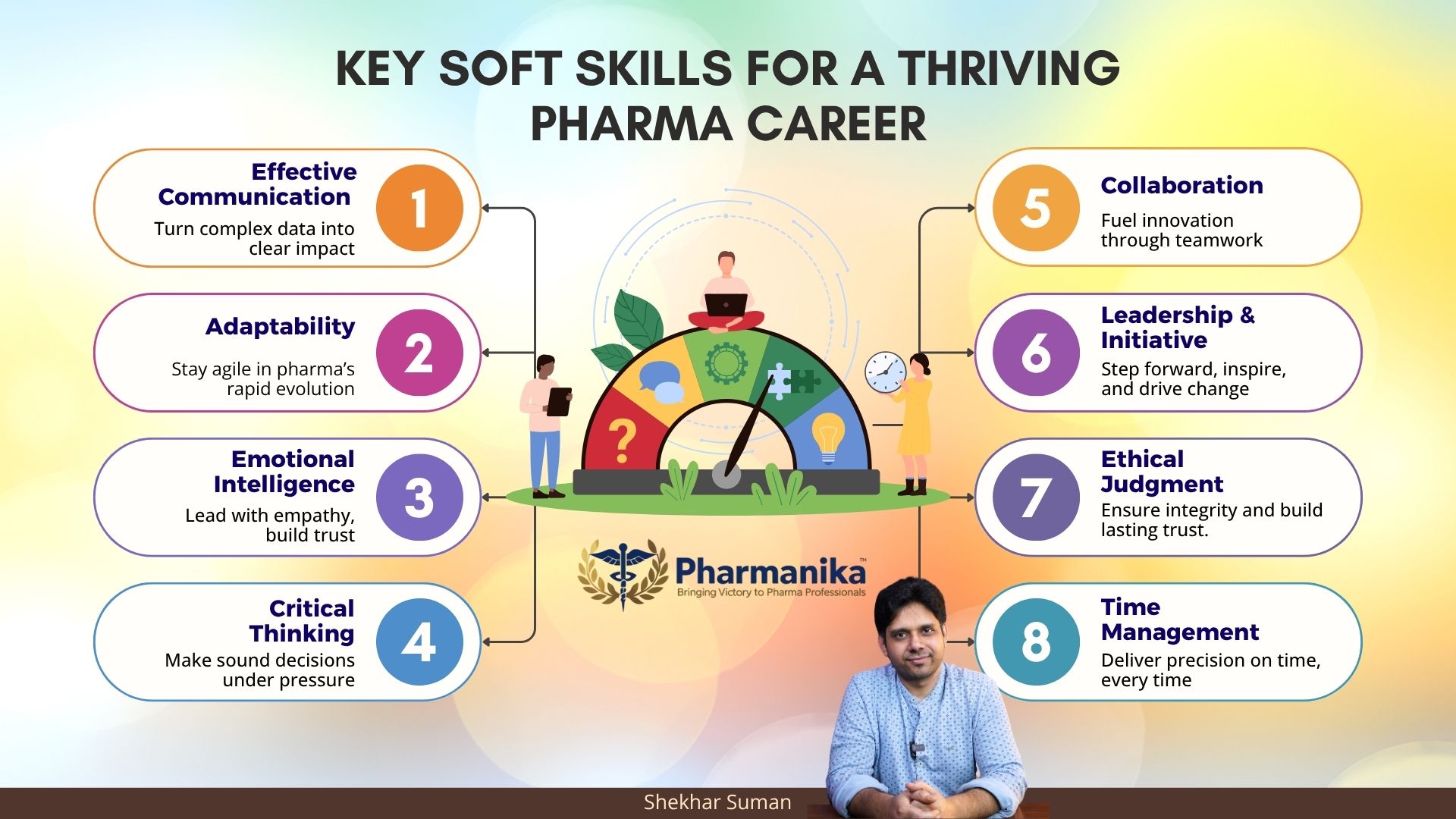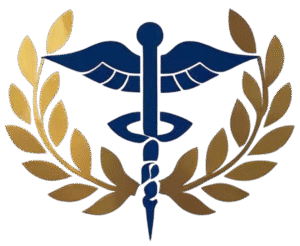Career in Pharma Industry: Soft Skills That Can Accelerate Your Career
In recent times, the Pharmaceutical industry worldwide is one of the most impactful and dynamic sectors. This industry blends innovation, patient care, and Science to develop life-saving medications and therapeutics. It is evolving rapidly and is primarily driven by digital transformation, AI and ML (Artificial Intelligence & Machine Learning), patient-centric innovations, Regulatory changes, as well as Pharmaceutical industry trends. If you aspire to set foot in the Pharmaceutical Industry and excel in this field, then you should read further to learn how to build a successful career in Pharma industry.
Technical knowledge alone wouldn’t secure long-term success in this industry; developing the right skills is crucial for a rewarding career in Pharma industry. Professionals with practical soft skills, such as adaptability, leadership, and effective communication, gain a clear edge in the industrial setting. These soft skills bridge human connection and Science, thereby enabling innovation, career growth, as well as collaboration. Soft Skills aid professionals in adapting, collaborating, leading, and solving problems effectively, as opportunities and challenges simultaneously evolve in the pharmaceutical industry.
So, if you’re a recent graduate aspiring to step into the Pharmaceutical industry or an experienced professional seeking leadership and an advanced role, in that case, developing these essential skills can be a game-changer for you and the industry.
01 Communication Skills for a Pharma Industry Career
Communication in the Pharmaceutical industry is way more than just sharing information. Effective communication is about delivering complex Scientific ideas and concepts in a way that is concise, compelling, as well as clear.
Whether explaining research findings to a Regulatory body, collaborating with a cross-functional team, or presenting data to clients, your ability to communicate effectively determines how your work is perceived and is a key driver for your career in Pharma industry.
Why does communication matter?
Professionals with poor communication can cause delays, errors, as well as misunderstandings. Hence, having strong communication fosters transparency, builds trust, as well as encourages collaboration.
How to improve communication in the Pharmaceutical sector?
- Modify your communication style professionally and listen actively.
- Enhance writing and presentation skills.
- Practice simplifying Technicality without losing accuracy in the subject.
Clear and effective communication transforms complexity into clarity, builds trust in every professional interaction, as well as ensures your ideas inspire actions in the industry. Strong communication is one of the most essential soft skills in Pharma.
02 EQ in Pharmaceutical Careers
EQ (Emotional Intelligence) is a person’s ability to manage as well as recognize their own emotions, and also influence as well as understand other professionals. In the Pharmaceutical Industry, all decisions have a significant impact on lives and health, as well as here EQ is particularly critical.
Why does EQ matter?
A professional with high EQ improves teamwork, strengthens leadership, as well as fosters trust. It also helps professionals navigate high-pressure situations calmly and effectively.
How to improve EQ?
- Reflect on personal weaknesses as well as strengths, and peek feedback.
- Managing and regulating emotions during stressful situations at the workplace.
- Practice empathy by understanding and acknowledging different perspectives.
Emotional intelligence bridges the gap between knowledge and impact, enabling stronger relationships and better decision-making under pressure.
03 Adaptability for Growth in the Pharma Industry
Global health challenges, Regulatory changes, and Technological innovations have led to the rapid evolution in Pharmaceuticals. Adaptability is the ability to embrace these changes, learn quickly, and respond with flexibility.
Why does adaptability matter?
Adaptable professionals can pivot strategies, adopt new technologies, and remain competitive in a fast-changing industry.
How to improve adaptability in the Pharma industry?
- Cultivate a growth mindset and view challenges as opportunities to learn.
- Take courses to expand your skills.
- Stay updated on Pharmaceutical trends and emerging technologies.
Adaptability turns uncertainties into opportunities, enabling you to stay competitive and grow your career in Pharma industry. Adaptability allows you to embrace opportunities in the Pharmaceutical sector.
04 Critical Thinking for Pharma Career Success
Professionals in the Pharmaceutical industry often deal with complicated problems, from Regulatory compliance issues to Clinical Trial hurdles. Critical thinking helps professionals seek effective solutions and evaluate situations objectively.
Why does critical thinking matter?
It empowers skilled Pharmaceutical professionals to make informed and data-driven decisions that improve processes and overall outcomes in the industry.
How to improve critical thinking?
- Explore creative solutions while respecting the Scientific foundation.
- Break problems into manageable and smaller portions.
- Ask thoughtful and valid questions to gather more in-depth information.
Critical thinking is closely interconnected to teamwork, as collaborative problem-solving is central to the Pharmaceutical Industry. Critical thinking guides professionals through complexity, ensuring that the solutions are both responsible as well as effective.

05 Initiative & Leadership In Building a Pharma Industry Career
Leadership is more than managing teams; it is inspiring others, driving results, as well as taking initiative. Even in non-managerial roles, leadership traits set high-skilled achievers apart from the rest of the industry.
Why does Leadership matter?
Leaders drive innovation, guide teams toward achievement, as well as inspire trust in the firm.
How to improve initiative & leadership?
- Develop resilience and decision-making skills.
- Mentor peers or juniors.
- Volunteer for projects and be an active part.
Leadership inspires others to drive meaningful change, follow your vision, and encourages progress, a vital quality for building a long-lasting career in Pharma industry. Leadership helps define your Pharma industry career path.
06 Teamwork & Collaboration for Career Growth in Pharma
The Pharmaceutical industry thrives on effective collaboration and teamwork. Projects involve diverse teams of Regulatory specialists, Researchers, supply chain managers, as well as marketing experts.
Why does teamwork & collaboration matter in the Pharmaceutical sector?
Collaboration & teamwork lead to faster problem-solving, improved efficiency, and better ideas. It builds a shared vision and helps align goals.
How to improve teamwork & collaboration?
- Participate in cross-functional teams and projects to build teamwork skills.
- Communicate clearly and openly.
- Respect diverse perspectives and professionals.
Collaboration multiplies professional expertise, thereby transforming individual strengths into collective achievements, forming a strong foundation for a successful career in Pharma industry.
07 Time Management in Pharma Industry
In the fast-paced Pharmaceutical industry, effective time management is essential for balancing multiple priorities without compromising the quality and quantity of products.
Why does time management matter?
Time management reduces stress, ensures deadlines are met, as well as enhances productivity in the Pharmaceutical workplace.
How to improve time management?
- Prioritize work based on impact and urgency.
- Break tasks into smaller goals.
- Use tools to organize tasks and schedules.
Time management turns goals into achievements, enabling you to deliver results efficiently without compromising quality.
08 Ethical Judgment for a Strong Pharma Career
Pharmaceutical professionals work under Regulatory and Ethical frameworks that are accepted globally. Ethical judgment ensures that decisions align with organizational values., Regulatory compliance, as well as patient safety.
Why does Ethical judgment matter?
Ethical integrity protects patients, maintains public trust, as well as builds credibility in Pharmaceutical discoveries.
How to improve Ethical Judgment?
- Seek mentorship for complex decision-making.
- Engage in open discussions about Ethical challenges.
- Understand Regulatory guidelines and standards.
Ethical judgment ensures that decisions, as well as safeguards, stand the test of integrity.
Essential Soft Skills Summary – At a Glance
|
Soft Skill |
Importance in Pharmaceuticals |
Quick Tips to Improve |
|
Effective Communication |
Ensures a clear understanding of complex Scientific data across teams, Regulators, and stakeholders. |
Simplify language, practice active listening, and improve presentation skills. |
|
Adaptability |
Helps professionals thrive amid rapid Technological and Regulatory changes. |
Stay updated on trends, embrace learning, and welcome change. |
|
Emotional Intelligence |
Builds trust, improves teamwork, and strengthens leadership. |
Practice empathy, self-awareness, and constructive feedback. |
|
Critical Thinking |
Enables informed decision-making and problem-solving under pressure. |
Break down problems, challenge assumptions, and consider alternatives. |
|
Collaboration |
Enhances creativity, efficiency, and innovation through teamwork. |
Respect diverse perspectives, encourage open communication, and contribute actively. |
|
Leadership & Initiative |
Positions you as a driver of change and inspires others to achieve goals. |
Volunteer for projects, mentor peers, and develop vision and decisiveness. |
|
Time Management |
Improves productivity and ensures the timely delivery of projects. |
Prioritise tasks, plan schedules, and avoid multitasking. |
In the Pharmaceutical industry, soft skills are the essential drivers of success. They complement Technical knowledge and enable professionals to lead, adapt, and collaborate in a constantly changing environment.
Investing in soft skills is a strategic career move that will shape your career in Pharma industry and open doors to leadership opportunities. They improve your ability to communicate clearly, solve complex problems, adapt to change, and lead with empathy. Building these skills for Pharma professionals will future-proof your career.
Start today by identifying the skills you want to strengthen, practicing them consistently, and seeking learning opportunities. Over time, these skills will transform your career trajectory, making you not just a competent Pharmaceutical professional, but a respected leader in the Pharmaceutical industry.
Your Technical expertise may open the door to opportunities in the Pharmaceutical industry, but your soft skills will determine how far you go in your career in Pharma industry; shaping the future of Pharma industry careers.






